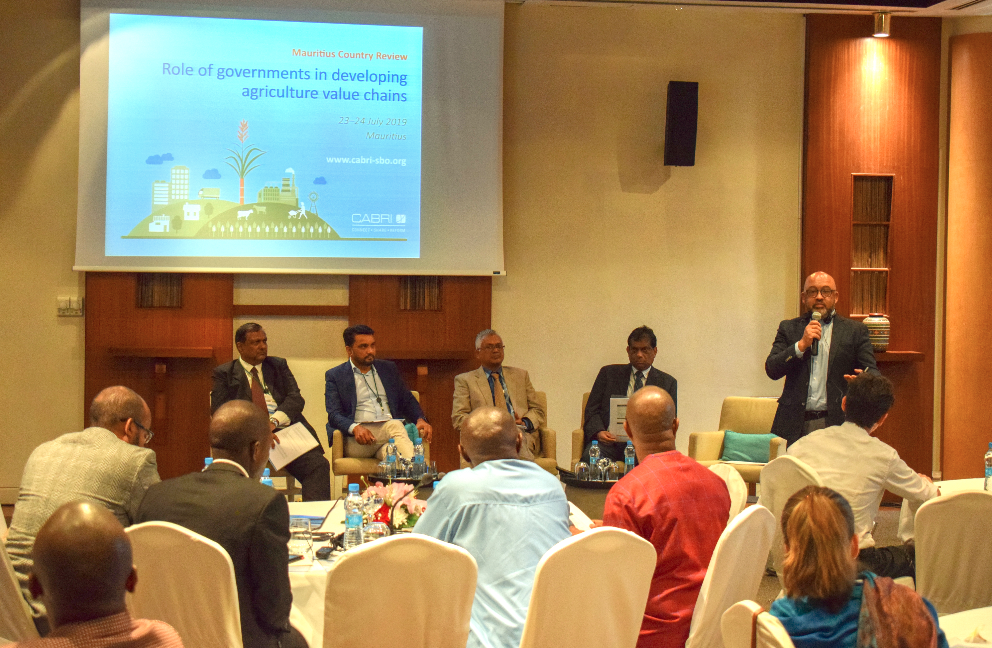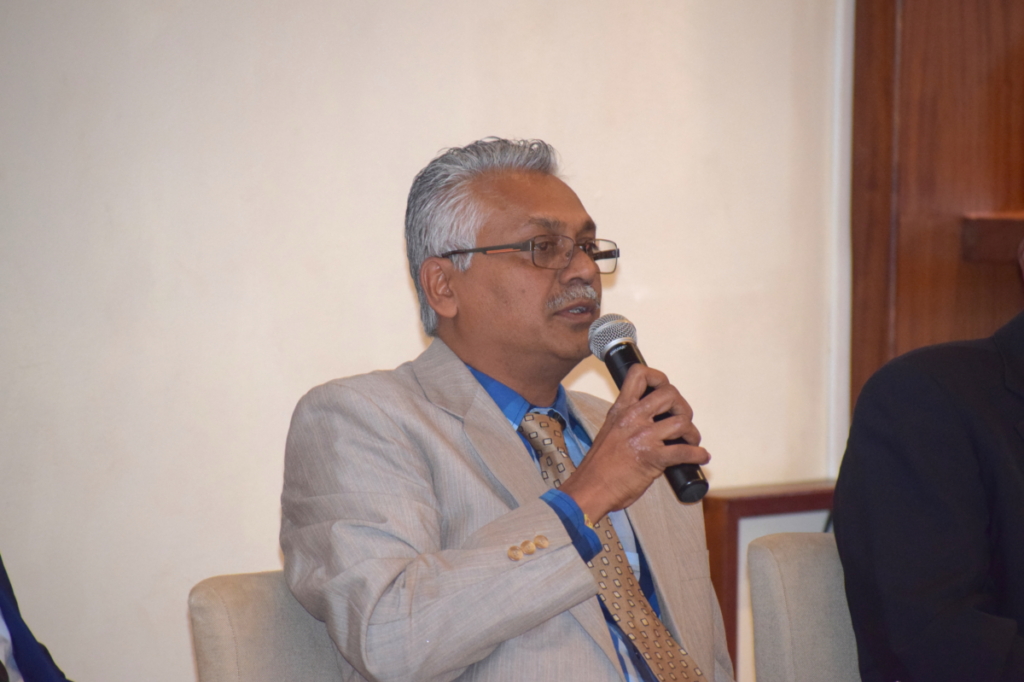
Yashwantsingh Ramdharee is a manager at the Mauritius Cane Industry Authority where he heads a sugar cane extension centre that focusses on implementation of government projects. He participated at the CABRI Mauritius country review on the role of governments in developing agriculture value chains. He was part of the panel discussion on, “Investing in Value Chains for Economic Transformation”. The blog provides an overview of the Mauritius cane industry, providing insight into some of the initiatives targeted at raising the incomes of small sugar cane farmers.

Yashwantsingh Ramdharee
Mauritius is an island country of 1,864 square kilometres and lies east of Madagascar and the southeast African coast. Economists often cite Mauritius as an example of economic success, having been able to evolve from a sugar-based monoculture within 51 years of independence, to a diversified economy that includes textiles, tourism, finance and information technology. Is everything rosy? Things have been changing. The blog explores some of the challenges faced by small sugar cane farmers and related private and government led initiatives and schemes aimed at providing support.
Sugar is undeniably associated with the history and development of the country, dating as far back as 1639, when Dutch settlers first introduced it. Today even though sugar production remains one of the major activities, its economic weight in terms of earnings, and even more with regards to employment, has steadily declined compared to other sectors that have emerged. As an export-oriented country, the main reasons for this include changes at the level of the World Trade Organisation (WTO) and the European Union (EU) on sugar trade since late-2000, which have caused drastic drops in earnings from sugar. In response, the industry has had to adopt a series of measures to re-structure itself as outlined in the Multi Annual Adaptation Strategy 2006-2015 report in order to maintain its productivity and competitiveness.
Sugar cane is cultivated on a total area of about 50,000 ha and the island has the capacity to produce some 500,000 tons of sugar annually. There are presently three sugar factories that produce both refined white sugar as well as high value added special sugars. Sugar export earnings represented Rs 8,538.1 million (USD 254.5 million) in 2017. Small farmers cultivating on less than 10 ha totalled some 11,031 ha and accounted for about 22% of national production in 2017. It is estimated that land area under sugar cane cultivation in this category of farmers has decreased by 44% in 2017 compared to 2006.
The recent world sugar price lows have further discouraged some small farmers and due to the lack of other viable alternatives; their land is left in an abandoned state. Even if the contribution of sugar exports to the national GDP compared to other economic sectors is very low, land under sugar cane cultivation has a multifunctional role to play. In Mauritius, sugar cane is exploited not only for the production of sugar as a sweetener but also for electricity generation using bagasse and for ethanol production from the molasses. It helps in the preservation of our natural asset by combatting soil erosion, and ultimately prevents the pollution of our beaches and lagoons. Thus, it promotes the ecological diversity and environmental preservation of the natural beauty of the island, which is the basis of the thriving tourism industry.
On the marketing side, international sugar buyers are not only interested in the Mauritian product range but also highly appreciate the high sugar quality and reliability of export logistics built over the years. Fairtrade International procures sugar produced by small farmers in Flocert certified and audited Cooperative societies at a premium price of 60 USD per MT. For the period 2009-2018, some 201,000 MT of sugar has been sold for about Rs 420 million as premium above normal sugar proceeds benefitting some 4000 small farmers. Another recent initiative is the Altromercato-Ferrero Sustainable Development Project. For the period 2016-2020, Ferrero has entered into contracts with 25 Cooperative societies comprising some 800 farmers for the purchase of 4000 MT of sugar annually at a premium of 40 Euro per MT, above normal sugar proceeds. The percentage of farmers in these initiatives represent about 35% of the total number of farmers, which is likely to increase further. Moreover, there is also growing interest to produce organic sugar in Mauritius which calls for the setting up of a completely new value chain.
However, these changes have also called for a change in behaviour from related farmers in complying with the standards imposed by the respective certification agencies, such as good governance, environment and societal responsibilities.
Most Mauritian sugar cane farmers own their land, which they have acquired from large sugar estates. However, they are faced with challenges related to labour scarcity, high costs of production and lack of collective management. A recent survey reveals that two-thirds of the planters are male, retired or pensioners, aged 60 or more while 96.3% of them have acquired at least primary school or higher education and the average ownership per farmer is about one ha.
In general, most planters tend to follow the recommended crop husbandry practices as set out by research and extension services. However achieving significant reductions in their cost of production through mechanisation of field operations is still a major challenge. This is because of the small size of holding and field layout. Attempts to regroup small farmer’s fields into larger units have met with little success. Except for a few planters who have recourse to mechanical harvest, most of them rely heavily of casual labour in their respective regions or on small labour and transport contractors.
Fully conscious of the challenges within the cane industry, successive Government policies have consistently supported all related stakeholders, particularly the small farmers. They benefit from the services of a palette of institutions catering for research, extension and training, sugar storage facilities, policy and regulatory functions under the umbrella of the Mauritius Cane Industry Authority, which for the past 2 years has been on a free of cost basis. Small farmers also benefit from direct support through subsidies and grants for e.g. de-rocking, and sugar cane crop renewal (Small Planters Regrouping Project and Agricultural Land Management System). Furthermore, in a bid to ensure the fair remuneration from sugar cane by-products, the Government has started a process of reviewing the income streams and in the short term, it is maintaining small farmers in business by implementing a price support policy over and above market prices obtained.
Resilience. For over 380 years, that sugar cane is in Mauritius, a new mentality is being cultivated.